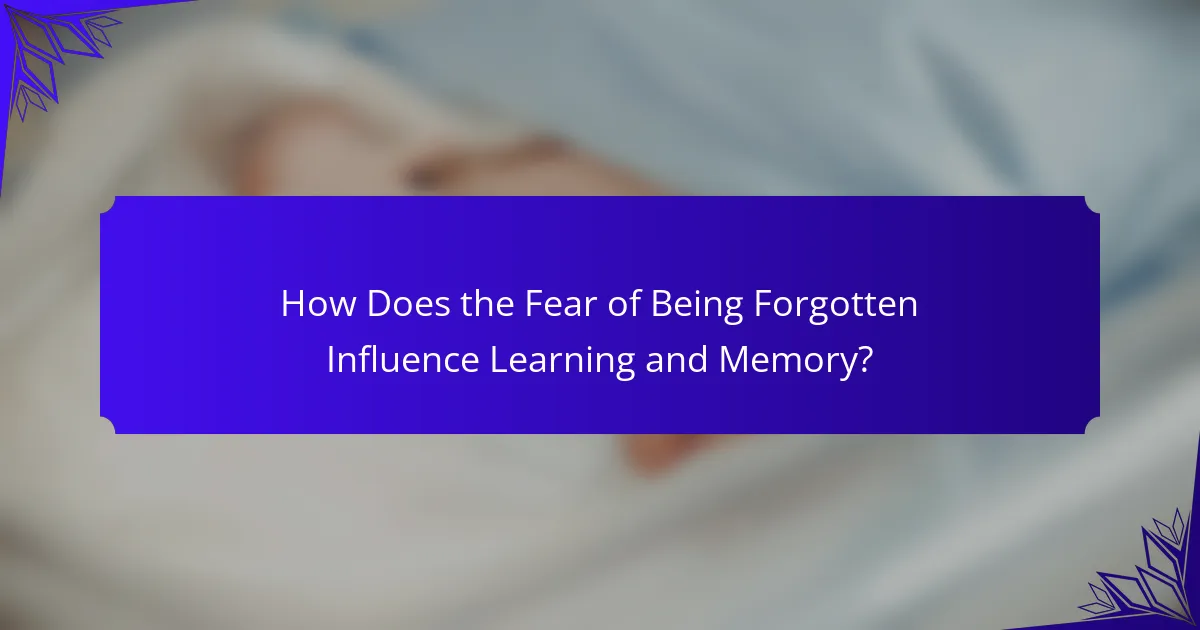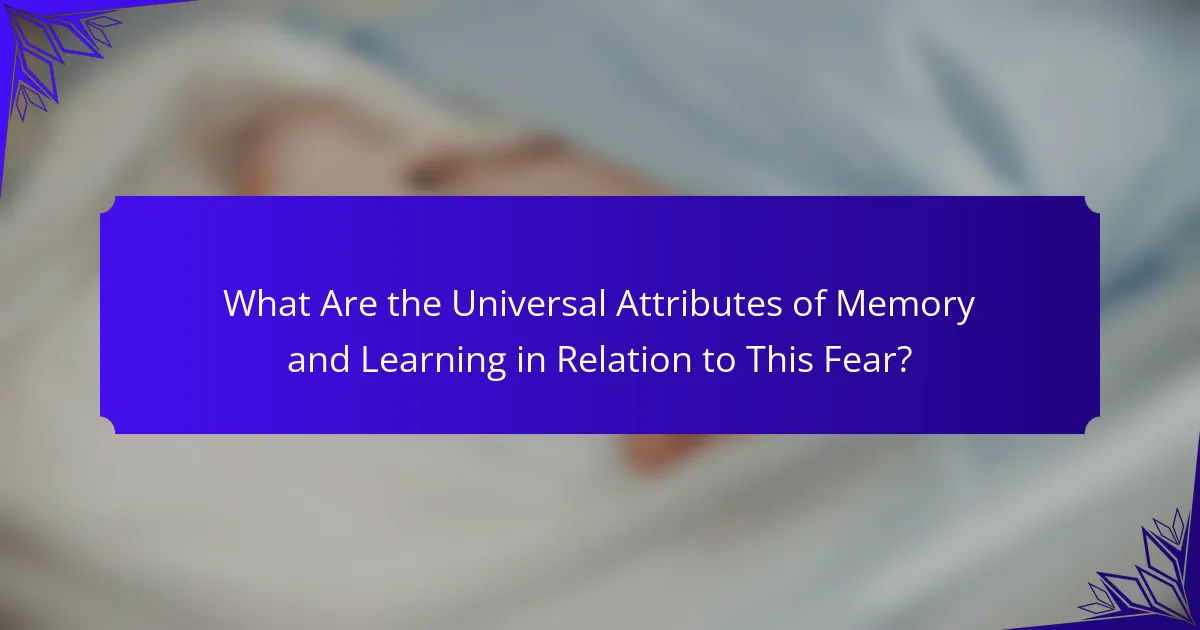The fear of being forgotten can significantly impact learning and memory retention. This article explores how this fear enhances emotional conditioning, influences social connections, and affects cognitive load. It also addresses psychological factors driving this fear, such as attachment styles and existential anxiety. Finally, effective strategies to mitigate these fears are discussed, emphasizing the importance of strong relationships and personal legacy.

How Does the Fear of Being Forgotten Influence Learning and Memory?
The fear of being forgotten significantly enhances learning and memory retention. This fear motivates individuals to engage more deeply with information, leading to stronger emotional connections and better recall. Research indicates that emotional conditioning, driven by this fear, can create lasting memories by prioritising information deemed important for self-identity and social connection. As a result, individuals may adopt strategies such as frequent repetition and storytelling to reinforce their memories, ultimately shaping their learning experiences.
What Psychological Mechanisms Underlie This Fear?
The fear of being forgotten is driven by psychological mechanisms such as social anxiety and attachment theory. These mechanisms influence memory retention and emotional responses. Social anxiety can lead to heightened sensitivity to perceived neglect, impacting learning and memory processes. Attachment theory suggests that fear of abandonment can trigger emotional conditioning, reinforcing the need for social connection. This fear can manifest in behaviours aimed at increasing visibility and social engagement, ultimately affecting cognitive functions and emotional well-being.
How Does This Fear Affect Emotional Conditioning?
The fear of being forgotten significantly impacts emotional conditioning by heightening anxiety and altering memory processes. Individuals often associate memories with strong emotional responses, leading to heightened sensitivity to social cues. This fear can create a feedback loop where anxiety reinforces negative emotional conditioning, making it difficult to form new, positive memories. As a result, individuals may struggle with learning and recalling information, impacting their overall emotional well-being.

What Are the Universal Attributes of Memory and Learning in Relation to This Fear?
The universal attributes of memory and learning related to the fear of being forgotten include emotional conditioning, social reinforcement, and cognitive load. Emotional conditioning links fear to memory retention, as heightened emotions can enhance memory formation. Social reinforcement emphasises the importance of relationships in learning, where the fear of being forgotten drives individuals to engage more deeply with others. Cognitive load refers to the mental effort required to process information, which can be impacted by anxiety related to this fear, ultimately affecting learning efficiency.
How Do Memory Retention Techniques Address This Fear?
Memory retention techniques effectively combat the fear of being forgotten by enhancing recall and emotional connection. Techniques like spaced repetition and mnemonic devices create stronger neural pathways, making information more memorable. As a result, individuals feel more secure in their knowledge retention, alleviating anxiety about being forgotten. These methods not only improve memory performance but also foster a sense of belonging and identity, addressing emotional conditioning related to memory fears.
What Role Does Social Validation Play in Learning?
Social validation significantly enhances learning by reinforcing memory and emotional responses. When individuals perceive social approval, it activates neural pathways associated with reward, leading to improved retention of information. This validation can also mitigate the fear of being forgotten, fostering a more engaging learning environment. As a result, learners are more likely to participate actively and absorb knowledge effectively.

What Unique Factors Contribute to the Fear of Being Forgotten?
The fear of being forgotten stems from deep-rooted psychological factors, including the desire for legacy and connection. This fear is amplified by social media’s role in preserving memories. Unique attributes like attachment styles significantly influence how individuals experience this fear. As a result, those with insecure attachments may feel more anxious about being forgotten. Emotional conditioning also plays a role; past experiences shape one’s perception of memory and significance. Understanding these factors can help mitigate the fear of being forgotten.
How Does Digital Culture Amplify This Fear?
Digital culture amplifies the fear of being forgotten by constantly reminding individuals of their online presence and legacy. Social media platforms create a cycle of validation through likes and shares, leading to heightened anxiety about memory and recognition. As a result, users may engage in emotional conditioning, striving for digital immortality by curating their online personas. This phenomenon can diminish authentic learning experiences as individuals focus more on digital impressions than genuine connections.
What Are the Implications of Social Media on Memory and Learning?
Social media significantly influences memory and learning by creating a fear of being forgotten. This fear can lead to emotional conditioning, where individuals prioritise immediate engagement over deep learning. Studies show that constant connectivity can impair memory retention as users often rely on digital platforms for information retrieval rather than internalising knowledge. Additionally, the pressure to maintain an online presence can distract from focused learning, resulting in shallow cognitive processing. Overall, social media’s implications on memory and learning underscore the need for balance in digital engagement.

What Rare Attributes Are Associated with This Fear?
The fear of being forgotten often includes rare attributes such as existential anxiety, which relates to concerns about one’s legacy and impact. This fear can manifest in heightened emotional conditioning, affecting memory retention and learning processes. Individuals may develop maladaptive coping mechanisms, such as over-reliance on social media for validation, which can further exacerbate feelings of isolation. Additionally, the fear can lead to unique behavioural patterns, such as excessive information sharing or compulsive networking, as individuals strive to maintain visibility and relevance in social contexts.
How Does Age Influence the Fear of Being Forgotten?
Age significantly influences the fear of being forgotten, with older individuals often experiencing heightened anxiety. As people age, they become more aware of their mortality and the potential for their memories to fade. This awareness can lead to increased emotional conditioning, where memories tied to significant life events become more pronounced. Research indicates that older adults might engage more in activities aimed at preserving their legacies, such as storytelling or documenting their experiences. This behaviour reflects a unique attribute of aging, as the desire for remembrance intensifies with the awareness of life’s transience.
What Are the Long-Term Effects of This Fear on Cognitive Functioning?
The long-term effects of the fear of being forgotten can significantly impair cognitive functioning. This fear may lead to anxiety, which disrupts memory processes and learning abilities. Research indicates that chronic anxiety negatively impacts attention span and information retention. As a result, individuals may struggle to recall information and form new memories effectively. Additionally, emotional conditioning related to this fear can hinder cognitive flexibility, making it challenging to adapt to new learning environments or experiences.

What Strategies Can Help Mitigate the Fear of Being Forgotten?
To mitigate the fear of being forgotten, individuals can adopt several effective strategies. First, fostering strong social connections can enhance feelings of belonging and remembrance. Engaging in regular communication with friends and family reinforces relationships and creates lasting memories. Second, practising mindfulness and self-reflection can help individuals recognise their unique contributions and value. This can reduce anxiety about being forgotten. Third, creating a personal legacy through storytelling or documenting experiences can provide a sense of permanence. Lastly, participating in community activities or volunteering can enhance visibility and connection, further alleviating fears of being overlooked.
What Best Practices Can Enhance Memory Retention?
To enhance memory retention, practice active engagement, spaced repetition, and emotional connection. Active engagement involves participating in discussions or teaching others. Spaced repetition optimises review intervals, reinforcing memory. Emotional connection strengthens recall by linking information to personal experiences or feelings.
How Can Emotional Conditioning Techniques Be Utilised Effectively?
Emotional conditioning techniques can be effectively utilised by creating strong associations between emotions and learning experiences. This method enhances memory retention and engagement. For instance, incorporating storytelling can evoke emotions, making content more memorable. Additionally, using positive reinforcement during learning can reduce the fear of being forgotten, fostering a supportive environment. Techniques like visualization can also help in anchoring emotional responses to specific concepts, further improving recall and understanding.
What Common Mistakes Should Be Avoided in Addressing This Fear?
To avoid common mistakes in addressing the fear of being forgotten, focus on fostering connections and engagement. Ignoring the emotional aspect can lead to ineffective strategies. Overgeneralising experiences may alienate individuals with unique fears. Additionally, neglecting to validate feelings can hinder progress. Lastly, failing to create supportive environments may exacerbate anxiety.
What Expert Insights Can Guide Learning in the Age of Digital Memory?
The fear of being forgotten significantly impacts learning and memory in today’s digital age. This anxiety can lead to emotional conditioning, where individuals develop coping mechanisms to enhance memory retention. Research indicates that constant connectivity and information overload create pressure to remember more, often leading to stress and reduced cognitive performance. Strategies such as mindfulness and selective information intake can mitigate these effects, promoting a healthier learning environment.


